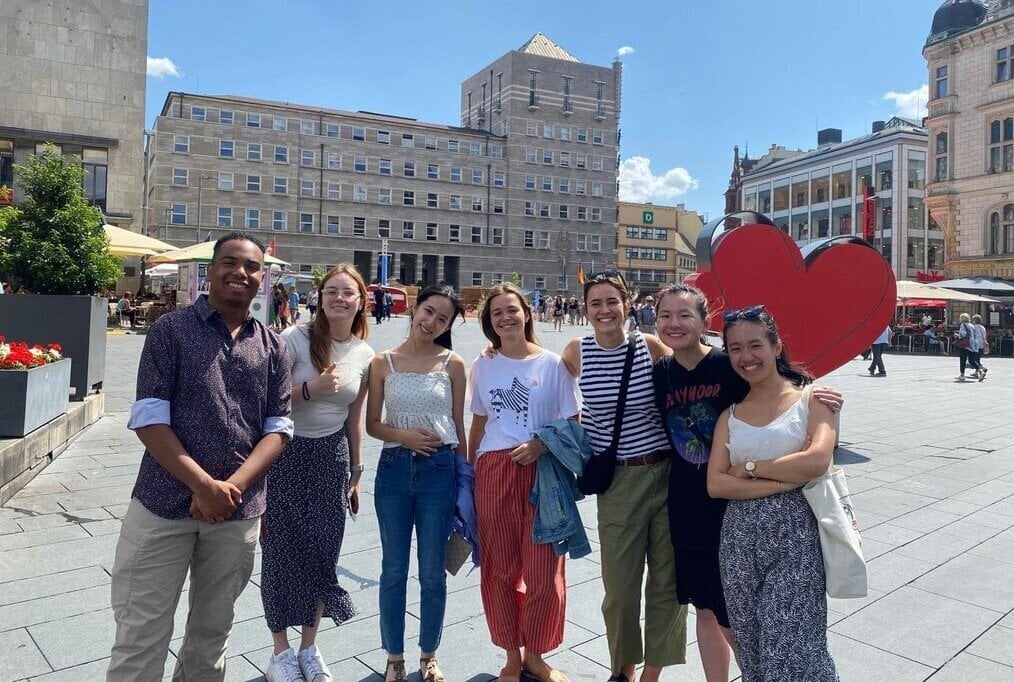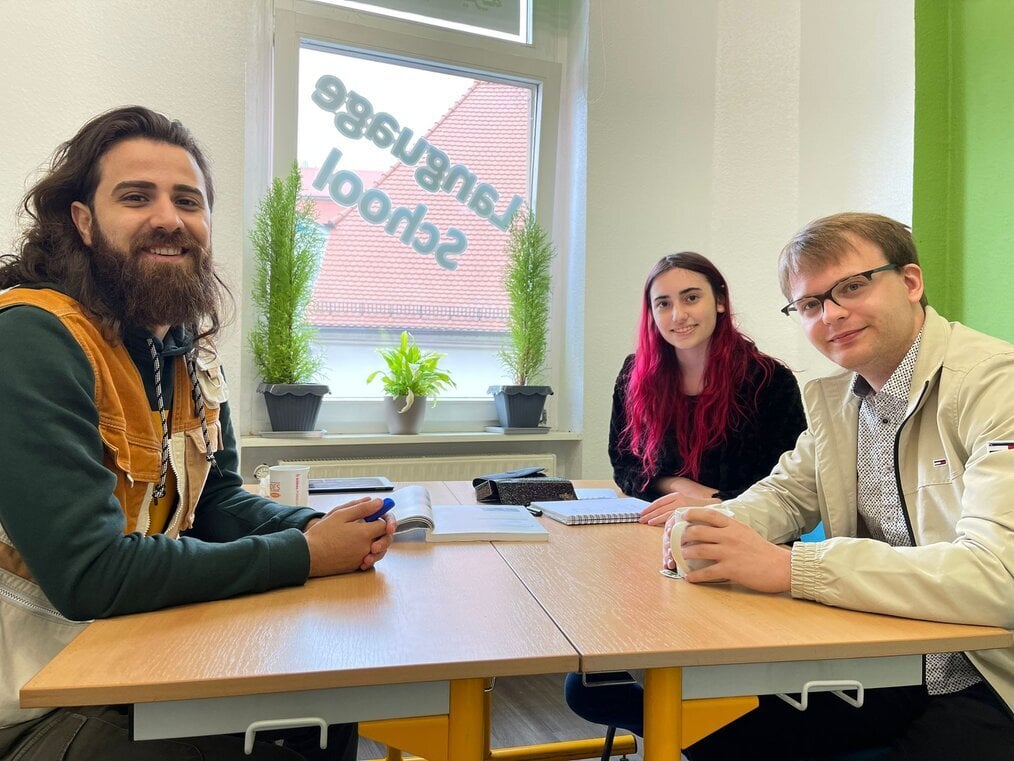
Learn German in Germany: Top Immersion Programs for 2025
Level up your language skills with a German immersion program abroad!
Whether you’re new to the language or have good foundational knowledge, learning German abroad can accelerate your skills and enrich your life in ways classroom study at home can’t. While studying German overseas will cost more than learning from YouTube or an app at home, it’s a serious investment that will take you far, academically and personally.
Read on to find out how to make your dreams of studying German abroad with our ultimate guide!
Why you should learn German abroad
You likely have your own reasons for studying German, be it for school, work, family, or even love! If you've ever asked yourself, "Should I learn German?" here are some of the top reasons why you should continue your studies abroad:
- It’s a beneficial language for traveling in Europe: It’s estimated that around 130 million people worldwide speak German as a first or second language. In addition to Germany, German is an official language in Austria, Luxembourg, Belgium, Liechtenstein, and Switzerland.
- German grammar can be difficult: A trained and experienced native teacher can teach you how to study German grammar points like cases and genders that can trip English speakers up. They will be able to correct you in real-time and answer any and all questions you’ll likely have.
- It’s a good way to make German-speaking friends: Native-speaker friends can help you practice in a natural setting. They’ll also introduce you to the best local spots. These connections can open up a lifetime of friendship!
- You can both learn about and experience important cultural points: Learning about German culture and food in a textbook is nothing like experiencing it firsthand. Some language schools may take you on field trips to supplement hands-on learning and practice.
- Total immersion is the best way to learn German: In your home country, your German learning usually ends when you walk out of the classroom or put down your phone or tablet. In a German-speaking country though, you’ll be surrounded by endless opportunities to listen to and speak the language. This will help you absorb it faster!
Best places to learn German abroad

There are a lot of great destinations with German courses, though the majority are located in Germany, Austria, and Switzerland. Here are a few of the best places to learn German abroad!
- Berlin, Germany: Famous for its arts scene, Berlin is also brimming with history. If museums, innovative art and tech, and a diverse food scene are up your alley, Berlin should be at the top of your list.
- Munich, Germany: Travel further south in Germany and you’ll discover Munich in the heartland of Bavaria. Munich is the home of Oktoberfest so if you like brass bands, beer, and bratwurst, then this is the place for you. It’s also a great jumping-off point for weekend trips to Austria, Liechtenstein, and Switzerland.
- Cologne, Germany: Heading to Germany’s west side, located closer to Brussels and Amsterdam than it is to Berlin, this 2,000-year-old city spans the famous Rhine River. During World War II almost all of the city was bombed, and its modern rebuild makes it one of the most unique-looking cities in Germany. Spend your weekends walking the cobblestone streets in the city’s Old Town and enjoying the city’s cultural offerings and fairs.
- Vienna, Austria: Austria’s beautiful capital is the cultural, political, and economic center of the country. Enjoy a world-famous coffee while you study after class or have a night out at the opera and experience the country’s musical history.
- Zurich, Switzerland: Switzerland’s largest city is a great place to study, with its beautiful lakeside restaurants and shops and the numerous walking paths through the Altstadt (old town) that show off its medieval history.
1. EF International Language Campuses

Location: Munich or Berlin, Germany
Program length: 2-52 weeks
Starting price: $1,510 USD
What's included: accommodation, meals, lessons, activities, placement and progress tests, learning materials
✅ Pros:
- Stay with a local German host family to put your classroom learning to practice!
- Earn college credits for courses 4 weeks or longer.
❌ Cons:
- Lunches are only included on weekends, so you’ll need to budget for weekday meals.
- If you’d rather live with other students in a shared apartment, it will cost extra.
Learn German in Berlin or Munich with EF International Language Campuses! Choose from basic, general, or intensive courses with between 20-32 lessons a week. Casual students and serious learners alike can find a program to suit their goals. In addition to structured classroom learning, there are plenty of social activities, tours around town, and the possibility of weekend trips.
Become part of a German family with a homestay that’s included in the price. If you prefer shared accommodation, it can be arranged for an extra cost. Even though a homestay might push you out of your comfort zone, it’s a great way to increase your language skills and make meaningful connections!
Program Details
2. The Excellence Center

Location: Halle, Germany
Program length: 1- 13 weeks
Starting price: $508 USD
What's included: accommodation, breakfast, classes and materials, trips around Halle
✅ Pros:
- Classes have no more than 5 students, giving you lots of personal attention.
- EC can work with you if you want to earn college credits.
❌ Cons:
- If you’re looking for a structured, packed itinerary, this program offers a lot of independence for students to explore on their own.
- You’ll need to set aside extra money in your budget for lunches and dinners.
Students of all ages and levels are welcome to join The Excellence Center family! Small and customizable classes allow you to learn what and how you prefer. Native speakers teach relaxed and engaging lessons in packages of either 12 (non-intensive) or 20 hours (intensive) a week. One-on-one private lessons can also be arranged for extra help.
Independent travelers will enjoy the freedom this program provides. Classes finish by 2 pm Monday to Friday and weekends are free, meaning you’ll have plenty of time to check out Halle and the surrounding areas. EC’s approach is community-focused so you’re likely to meet some potential travel buddies in your classes!
Program Details
3. Global Work & Travel

Location: Berlin, Germany
Program length: 2-12 weeks
Starting price: $4,695 USD
What's included: accommodation, activities and excursions, pre-departure support, visa support, airport pickup and dropoff
✅ Pros:
- Choose between a shared room in a boarding school or a homestay with a local family.
- With 30 lessons a week, you’ll level your German up quickly!
❌ Cons:
- Meals aren’t included in the shared dorm. With a homestay, only some meals are provided.
- Classes can have up to 12 students, so you may have less individualized attention.
If you’re looking for an intensive, total immersion program Global Work & Travel to boost your German skills, this program may be for you. Students take 30 hours of classes a week but learning doesn’t stop in the classroom. There are half-day and full-day excursions every Wednesday and Saturday, respectively, that are conducted fully in German. Serious students who want to leave English behind during their time in Berlin will have plenty of opportunities to practice new language skills.
Activities include museums, sports, bicycle tours, and trips to historic cities like Dresden, Leipzig, and Potsdam. If you’re a new or nervous traveler, Global Work & Travel offers everything from support from start to finish from your own personal travel concierge who will help you with bookings and travel arrangements. They’ll even pick you up at the airport to make sure you arrive safely at your accommodation.
Program Details
Cost of learning German abroad
When learning German abroad, there are several costs to factor into your budget. These figures are just a guide and will vary based on the city you choose. When you do your research be sure to include the following in addition to the course tuition:
- Airfare
- Housing (unless included in course fee)
- Food
- Excursions, cultural activities, and entertainment
Courses that include accommodation can start at anywhere from $500-$800 per week though this depends on the location.
Don’t forget to search for available scholarships through DAAD, the German Academic Exchange Service.
How to choose a German language program

Choosing a German language program is as simple as these two steps! Let’s break it down to give you a starting point for your German learning journey.
1. Identify your needs
Before you start researching, you’ll need to figure out what you want in a program. Some points to consider include:
- Cost: Your budget will help guide your potential location as well as the length of time you spend abroad.
- Length: How much time do you have to spend abroad? Are you looking for short and intensive or longer term?
- Location: Do you want to check out Oktoberfest or go skiing in the Alps? Are you happier in a big city or close to nature? Do you need to learn a certain dialect for work or future university studies?
- Goals: Are your language goals seriously focused on fluency or are you looking for a fun, laid-back cultural experience?
2. Search for programs
GO has loads of great German language schools to choose from, especially the ones mentioned above! You can filter by location and length and read reviews from participants to get an honest view of the programs.
Continue your journey learning German abroad
There are countless fabulous destinations to take your German to the next level, you just need to choose one and start the adventure. Take strides in your language journey by finding the perfect German language school for you – you won’t regret it!






